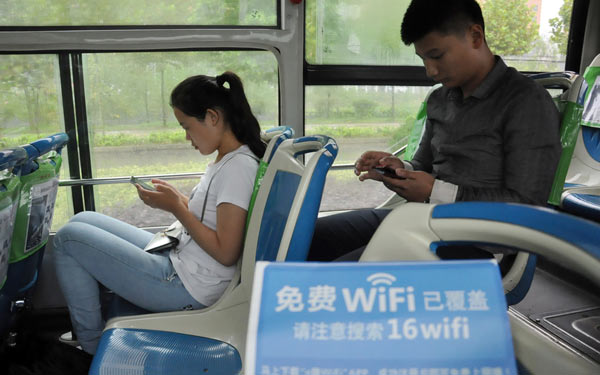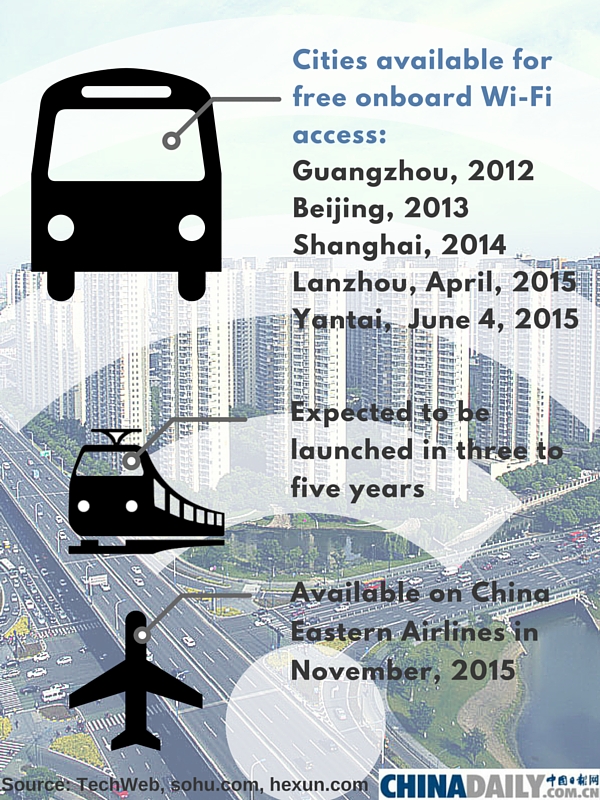

 |
|
Photo taken in Zhu Madian, Henan province shows two bus passengers access to internet provided by 16WiFi's onboard Wi-Fi hotspot service in 2014. [File photo/IC] |
Beijing's phubbers who are addicted to using smartphones on public transport will welcome the addition of free onboard Wi-Fi service coming to most of the capital's buses this fall.
Brand new in-car Wi-Fi hotspots named 16Wi-Fi have already embedded on all the No. 300 buses on Monday in Beijing, according to Beijing-based Yilu Redian Information and Technology Ltd.
According to the company, by the end of September, 180,000 buses operated on City routes will be equipped with free Wi-Fi services thanks to 16Wi-Fi hotspot.
Backed by Qicai Group, a company specializing in promoting onboard advertisements for public transport, Yilu Redian is the original provider behind the project.
The company aims to provide in three years free Wi-Fi services that cover 500 million passengers around the country.
"Our newly launched solution will let at least 40 passengers access to the mobile internet, with a download speed at a maximum 400KB per second and the service will satisfy about 6 to 7 of them to enjoy watching high definition online video content at the same time," a statement from the company's technical team said.
Passengers need to download an app and register an account before they are able to access the signal.
WiFi services on buses are rather different from what is used at home. The stability of the internet connection speed may be affected by circumstances, such as the vehicles maintaining mobile activities, static signals, bumpy roads or even extreme weather.
According to technology media site tech.sina.com.cn, prior to the debut of 16Wi-Fi, the company jointly worked with China Mobile (Beijing) and local public bus operators to gradually deploy its previous generation in-car Wi-Fi hotspot on some of the routes back in 2013.
However, due to technology limitations and unsatisfied user experiences, "the project has not received much positive feedback though several hundred million yuan have been invested and more than 30,000 buses around the nation have utilized the service," said Qiu Chaomin, founder of 16Wi-Fi.
Qiu claimed that by comparing with a domestic mobile application named "Wi-Fi Master key" that also enables users to access nearby Wi-Fi hotspots, the public transport Wi-Fi provider has to overcome a series of challenges, including spending an amount of prophase investments on hardware and software research and development, negotiating with telecommunication operators to purchase internet data and promoting, managing and maintaining the products.
"More services and applications, such as entertainment and games, e-commerce and online to offline service, will be utilized through the 16WiFi project, which is an access to attract mobile internet users on board, as the user base increased to a certain level," Qiu added.
The company launched an experimental project in May in Southwest China's Kunming city, providing a similar service on nearly 2,000 buses, and Qiu believed that the management team in Kunming will achieve balance between income and expenditure by August this year.
In December last year, the company completed its A-Round financing for 138 million yuan ($20.6 million). Last month, it closed its B-Round with another 300 million yuan in financing.
Zhu Lingqing contributed to the infographic.
